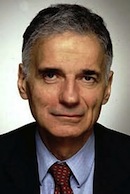[box type=”info” style=”rounded” border=”full”]
Not already a member? [button size=”small” link=”https://www.booksigningcentral.com/payment-plans/”]Sign Up Now[/button]to get full access to all upcoming schedules, author events, book signings, and more.[/box]
 More than ever, America needs fresh ideas—and bold solutions. Now, Ralph Nader—perhaps our last great civic idealist—offers seventeen ideas to rescue our country from corruption, complacency, and corporate domination.
More than ever, America needs fresh ideas—and bold solutions. Now, Ralph Nader—perhaps our last great civic idealist—offers seventeen ideas to rescue our country from corruption, complacency, and corporate domination.
America is in crisis. After enduring two decade-long wars and a devastating financial meltdown, We the People have been abandoned by the leaders we elected to serve our interests. Now, in response to our desperate times, pioneering reformer Ralph Nader offers a new program of seventeen ambitious but common-sense solutions to our chronic economic and social problems. Among them:
Reforming the tax system
Making our communities more self-reliant
Reclaiming science and technology for the people
Protecting the family
Getting corporations off welfare
Creating national charters for corporations
Reducing our bloated military budget
Organizing congressional watchdog groups
Enlisting the enlightened super-rich
Nader offers a stark assessment of our shared straits, but his solutions constitute an eye-opening plan to save America—before it’s too late.
Publishers Weekly
Consumer advocate and former presidential candidate Nader shares his progressive, humanitarian ideas for how to improve American lives in an era when corporate profits are skyrocketing, but American workers and their families are poorer than they’ve been in decades. Taking on corporate crime, tax reform, civil liberties, and alternative energy, among other topics, Nader emphasizes how “a shift in power from the few to the many” will lead to more fairness, less corruption, and economic stability. He urges Americans to break the stranglehold of gigantic corporations by cracking down on their subsidies, tax loopholes, and corporate crime. In addition, he advocates for a tax on Wall Street speculation and federal charters for U.S. corporations that would empower shareholders, require companies to observe union rights, and abolish “the legal fiction” that corporations are people. Nader is most effective when he urges Americans to re-engage with civic life, retake control of the public airwaves, and become consumer advocates and congressional watchdogs, and he offers practical advice for doing so. He is less convincing when calling on Congress to impeach the current and former presidents for the unauthorized wars in Libya and Iraq, or when he tries to link the violence in video games to rising youth crime. But overall, Nader’s passionate ideas should resonate with all concerned Americans. (Oct.)















